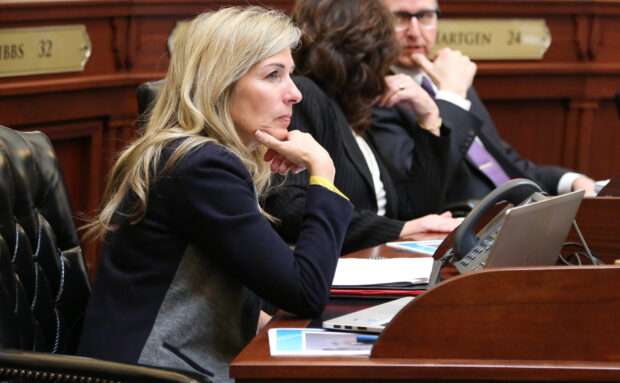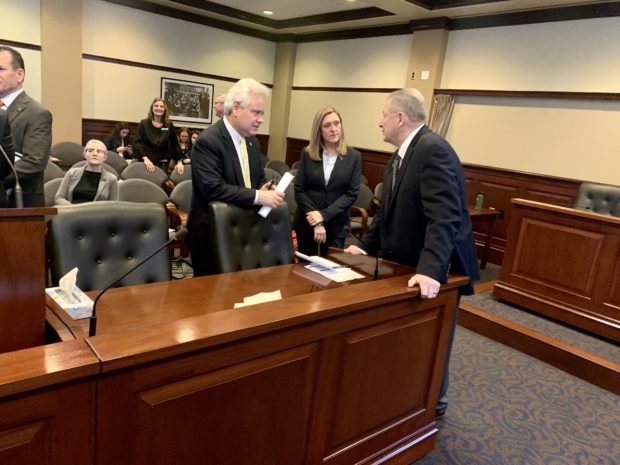A divided House Education Committee killed a bill Thursday that was designed to provide all Idaho classroom teachers with a stipend to purchase supplies for their classroom.

Rep. Gayann DeMordaunt, R-Eagle, has pushed House Bill 554. It called for the State Department of Education to “equally distribute funds for the purchase of classroom supplies and materials to each public school classroom teachers for kindergarten through grade 12.”
Even if the bill had passed, it would have been subject to the Joint Finance-Appropriations Committee appropriating funding specifically for that purpose.
DeMordaunt used $100 per teacher, for an annual cost of about $1.6 million as a potential example. But Gov. Brad Little and Superintendent of Public Instruction Sherri Ybarra did not recommend any funding for DeMordaunt’s bill in their 2020-21 budget proposals.
Before the bill died, DeMordaunt said Idaho teachers spend about $400 of their own money on supplies, and students shouldn’t be at the mercy of whether their teacher has enough money to pay out of their own pocket. DeMordaunt even said some teachers are turning to online crowd-funding websites to raise money for supplies.
“It’ll focus on flexibility and responsiveness to individual classroom needs, equitably distributed across the state,” DeMordaunt said. “These funds don’t go through layers of bureaucracy.”
Rep. Steve Berch, D-Boise, supported the bill.
“Isn’t the root cause of this problem the fact that schools aren’t getting enough money to begin with?” Berch asked.
Rep. Dorothy Moon, R-Stanley, led the effort to kill the bill. She called back to House Education’s unanimous vote on Wednesday to advance Little’s $223 million teacher pay proposal to the House floor.
“I think after yesterday’s vote, I think we all love teachers,” Moon said. “And we’re talking sizable amounts of money from yesterday. I think to even entertain this bill is not prudent. I do believe that our supplies are provided in closets or they are ordered at the beginning of the school year. So, I think this is money that can be better spent, as the good gentleman said, toward salaries and so forth.”
The Idaho Freedom Foundation also testified against the bill during the hearing.
“One thing that’s very problematic about this is it makes the assumption that every classroom’s needs are the same,” Idaho Freedom Foundation Vice President Fred Birnbaum said.
Following the 9-6 vote to hold the bill in committee, HB 554 is dead for the year.
College and university presidents
More than seven months after she sent a letter pushing back against diversity programs at Boise State University, there was no mention of the issue when Rep. Barbara Ehardt, R-Idaho Falls, faced Idaho’s college and university presidents Thursday at the Statehouse.
Ehardt and seven other members of House Education signed the July 9 letter, but none of them asked about Black graduations, Pow Wow, Project Dream or programs for underrepresented students that they called out in the letter.
The presidents of Boise State, Lewis-Clark State College, Idaho State University and University of Idaho made a joint appearance in front of House Education.
The presidents highlighted their collaborative approach to working with each other, freezing tuition costs and responding to state-mandated budget reductions.

The hearing was short and sweet by House Education standards and nothing about diversity programs or Ehardt’s transgender athletics bill came up.
Legislators asked the presidents about budgeting, their leadership styles, how they geared up for their roles leading complex higher education institutions and the role athletics play at colleges and universities.
Ehardt only asked one question of Tromp — what is Boise State doing to advance its online course offerings to reach more students?
Tromp responded positively, saying she was proud of Boise State’s efforts with online education.
One theme that came up multiple times was the difficulties colleges and universities have dealing with the state budget reductions and the University of Idaho’s projected $22 million deficit.
“We’re going to lose something as we cut these programs, and I just think we all need to understand that,” University of Idaho President Scott Green said. “We’re going to do it, because that is what we’ve been asked to do, but we are losing things.”
Finally: Senate Education wraps up rules review
On the 53rd legislative day, the Senate Education Committee finally tied a bow around the time-consuming and contentious process of reviewing education rules.
The committee voted unanimously to adopt the final rule on its to-do list: a rule on teacher certification requirements.
This rule — and its legislative review — is relatively routine. The state’s Professional Standards Commission presents sections of this rule to lawmakers for review, on a five-year rolling basis.
But this rule became embroiled in a larger and unprecedented legislative review of every agency rule on the books. On Feb. 4, House Education voted to repeal all rules for certification of beginning teachers. Senate Education voted on Feb. 12 to reinstate these certification rules, effectively overriding the House.
But that Feb. 12 vote didn’t cover the second teacher certification rule, which Senate Education approved Thursday.
Before Thursday’s vote, senators received a letter from state superintendent Sherri Ybarra, who pledged that her State Department of Education would review all of the teacher certification rules over the next 18 months.
“The goal would be to provide our teacher preparation programs with more flexibility and opportunity to innovate,” Ybarra said in her Wednesday letter.
The rules review — including an impasse over math, English language arts and science academic standards — became one of the defining education issues of the 2020 session. Before the session, Senate President Pro Tem Brent Hill said the rules review would take only a few weeks.
Friday will mark the end of the eighth week of the session.
Idaho Education News reporter Kevin Richert contributed to this report.
